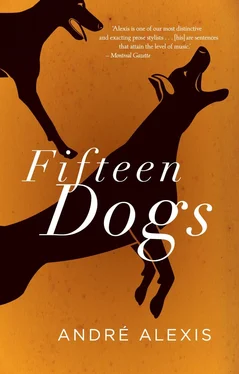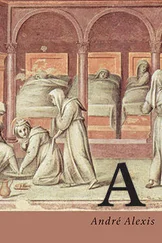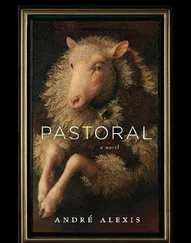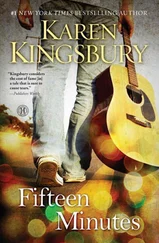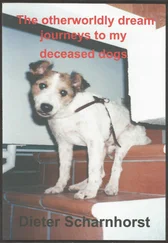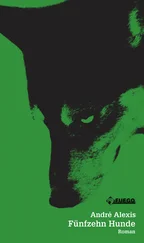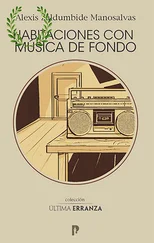There were other problems that, Nira assumed, had their origins in Majnoun’s culture as opposed to his nature. For instance, she thought it distasteful for male dogs to mount females en masse, each waiting his turn. Majnoun did not even pretend to take her distaste seriously. A bitch in heat was a bitch in heat. There could be no argument about that and, as the bitches themselves wished it, he could not see why it shouldn’t be done. She had to admit he had a point. She could imagine herself in heat, craving the friction of anonymous intercourse, but she was convinced that if she could influence Majnoun’s attitude she might improve the life of female dogs by teaching Majnoun a respect he could pass on.
The line between natural (the things Majnoun couldn’t help doing) and cultural (the things he could) was neither clear nor fixed. This was easy to forget in the heat of a dispute. It was just as easy to forget that Majnoun was not hers to improve. But, in any case, their fateful disagreement came over an idea that was impossible to put in one column (nature) or the other (culture), belonging as it did in both. More: it was an idea that mattered to Nira as much as it did to Majnoun: status.
As far as Majnoun was concerned, Miguel was the leader of their little pack. This thought annoyed Nira. She refused to allow that she was somehow subservient to her husband. There was no convincing Majnoun otherwise, however. He saw how she deferred to Miguel. He heard the echelon in their tones of voice (hers inevitably deferential), saw it in how they walked together or ate at the table. Their unequal status was so clear that it seemed to Majnoun as if Nira were trying to improve her station by feigning ignorance.
Majnoun’s relationship to Miguel was nuanced, but not complex. He would have given his life for Nira, not Miguel. This was at least in part because Miguel was the head of their household and Majnoun looked to him for protection. Miguel, who did not believe Majnoun was gifted or unusual, would get down on the ground and play with Majnoun, pushing his head from side to side, chasing him, taking his chew toys away from him and throwing them about, roughly scratching Majnoun’s belly and flanks. This was all, no doubt, undignified, but it was a pleasure to compete with Miguel for possession of a ball, to bark unselfconsciously when Miguel pushed him, to jump up on Miguel in a play at dominance. Nira tried to play with him, too, of course. She would throw the chewy, red ball around when they were outside, but you could tell her heart wasn’t in it. She couldn’t bring herself to say
— Go get it, boy! Go get it!
as if the ball were the most important thing on earth. For one thing, it seemed insulting to pretend that the ball mattered when she and Majnoun both knew it did not. In the end, Miguel was like a strong dog whom Majnoun both feared and admired, so he was offended when Nira questioned her husband’s status.
Unfortunately, Nira would not leave the matter alone. One day, she asked whom he thought was next after Miguel, if Miguel was the, as she put it, ‘grand high poobah.’ This was, on the face of it, an offensive question, but her sneering tone was especially galling. As far as Majnoun was concerned, he and Nira were of equal status. Her question amounted to a denial of this. He let her know his feelings as forcefully as he could without attacking. He growled, his teeth bared, his tail lowered. It was a distressing moment for both of them, but Nira’s question had been unspeakably rude. For days after their contretemps, Majnoun refused to acknowledge her presence, turning away from food she put down, leaving a room whenever she entered it. Nira realized that she had unwittingly gone too far, but he would not accept her apologies. For Majnoun, there seemed but two ways open to him: stay with someone who had challenged his status or leave for good. If he stayed, he would have to teach Nira to respect him. New to the ways of argument, he did not know how to do this without violence. But he would have died a thousand times rather than hurt Nira. And so, seeing no other way, Majnoun chose exile. He left the house without letting her know that he was gone for good.
This was the fateful moment, of course. A number of the gods having wagered on Majnoun’s death, there was, on the part of those who wished him to die happy, interest in a reconciliation. Were it not for Zeus’s edict, any number of them might have stepped in. As it was, none dared do anything openly. But Hermes, nursing his resentment, was upset by the impasse between Majnoun and Nira. He had intervened to save Prince, not Majnoun, but he was among those who believed Majnoun, at very least, could meet a good death.
— My poor, dear brother, said Apollo. There goes your last chance. The dog will be miserable without the woman, don’t you agree?
— When it comes to mortals, answered Hermes, not even we know the future.
Apollo laughed.
— Spoken like a human, he said.
Though Hermes laughed, the insult stung. And so, despite his father’s warning, the god of thieves and translators intervened in Majnoun’s life. Dreams being his preferred medium, he appeared to Majnoun while the dog slept.
+
Majnoun had not gone far from home when he suddenly felt tired. He barely managed to find a safe place before he fell asleep. He began to dream at once.
He was in a meadow bounded on four sides by darkness. The meadow was covered in grass so green it looked painted. He himself was beneath a tree whose bole extended up as far as could be seen, disappearing into a single white cloud. The place was not frightening but it was somehow dangerous. Majnoun crouched down, ready to spring or to jump away from whatever came out of the darkness. What came was a poodle as black as he was but much more imposing.
— I haven’t much time, said the dog.
It spoke no particular language. Its words were in Majnoun’s mind, like a strange idea.
— You must not leave Nira. Your life is with her.
— I cannot go back, said Majnoun.
— I understand your predicament, but you have misinterpreted Nira’s words. Humans do not think as you do.
— As we do, said Majnoun.
— As you do, said Hermes. I am one who wishes you well, but I am not a dog. Return to Nira. You will never misinterpret her words again, nor she yours.
— How can you know that? asked Majnoun.
— I have said it and so it will be, answered Hermes.
With that, the dream ended and Majnoun woke. He was on a lawn near High Park, not far from the arched entrance on Parkside, not far from where the streetcars turn around. Majnoun had had dreams before, of course, but none had ever been as vivid. He could recall its every detail and, despite himself, he wondered if he’d been dreaming at all.
The answer came soon enough. Walking along Parkside, Majnoun was assaulted by music coming from a car radio that was turned up loud. Majnoun heard the words
In the golden tent of early morning
when the sky has turned its back
when the sky has turned its back and isn’t listening
when the scallops stand upright on their hinges …
Then the car took off and he could no longer make the lyrics out.
There was nothing unusual about the loud music. Men in automobiles often tried to hurt one with noise. But Majnoun suddenly understood the lyrics, mysterious though they were. He understood that lyrics were not meaningful the way human words usually are, that lyrics were a ground where sense, rhythm and melody engaged. At times, sense won out; at times, rhythm; at times, melody. At times, the three things were at war, the way emotion, instinct and intelligence were at war within him. At times, the three were in harmony. The lyrics he’d heard suddenly struck him as a brilliant skirmish and, like someone who finally gets a joke, Majnoun sat and laughed, laughing as Benjy once had: gasping for breath while a feeling of pleasure escaped from him.
Читать дальше
